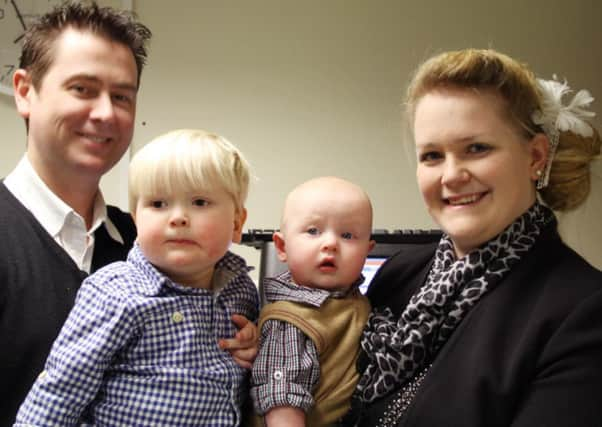‘Gene machine’ speeds up diagnosis for Jae


Jae Machin, two, was diagnosed with a glycogen storage disease (GSD) after his blood was tested using the two next generation sequencers at Sheffield Children’s Hospital.
The condition is a serious but treatable metabolic disorder that can be caused by gene mutations affecting different tissues including the liver, muscles, or the heart.
Advertisement
Hide AdAdvertisement
Hide AdThe new technology allows experts to screen up to 100 genes all at once for mutations that may cause the disease, instead of one at a time.
It means that tests can be returned in a matter of weeks instead of the previous system which could take up to a year, enabling treatment to begin more quickly.
The youngster’s symptoms were flagged up by specialists at Doncaster Royal Infirmary and tests were carried out by experts in Sheffield.
He is being treated by changes to his diet, including regular feeds of cornflour to stabilise his blood sugar levels. By his teens, it is hoped that Jae will have grown out of the condition.
Advertisement
Hide AdAdvertisement
Hide AdHis mother Jennifer Machin, 36, of Conisborough, said: “Identifying the gene that caused the problem is making a difference, as we can make changes to Jae’s diet and can now manage the condition effectively. It will also make it much easier when it comes to testing other members of the family.
“Having the diagnosis has already made a difference to Jae and to our family life, and it is great that many other families will benefit from having access to this technology.”
The sequencers at the hospital are among only two of around 15 at NHS trusts and have been funded by The Children’s Hospital Charity.
Sufin Yap, a consultant in metabolic medicine, who diagnosed Jae, said: “Before the gene sequencer arrived finding the correct gene was like looking for a needle in a haystack.
Advertisement
Hide AdAdvertisement
Hide Ad“Under the old system it would have taken at least six months to find the gene, whereas with the new system it took just two months. This means our patient will receive definitive treatment faster than before.”
Darren Grafham, head of laboratory services for genetics at Sheffield Children’s NHS Foundation Trust, who has been working on the first phase of testing for patients suspected of having GSD, said: “We are very excited to have this technology in our lab now and to begin to apply this in a clinical setting.
“The patients who will benefit are those with conditions where they have symptoms but it is unclear what the cause might be.”
The sequencers will eventually be used to test for a wide spectrum of diseases including connective tissue disorders and inherited diseases.
Advertisement
Hide AdAdvertisement
Hide AdFunded by the charity following a £500,000 donation, the new technology is based in the laboratories at the hospital and can test DNA from any living organism.
David Vernon Edwards, director of The Children’s Hospital Charity, said: “This state-of-the-art equipment has the potential to make such a massive difference to the lives of the hospital’s young patients and their families – we’re so proud to be a part of such a fantastic project and we’re so grateful to our supporters for their incredibly generous contributions.”
The charity Yorkshire Cancer Research has also committed funding to upgrade the facility once new technology becomes available, so that cancer genomes can be characterised in fine detail.
Its head of research, Kathryn Scott, said: “This technology moves incredibly quickly and it is essential to ensure the facility is future-proofed so it continues to deliver maximum patient benefit and research capability.”